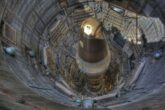March 28, 2024
A World Full of Missiles
What Mass Proliferation Means for Global Security
Over the past decade, there has been an increase in the proliferation and use of ballistic and cruise missiles. Much of this increase stems from Tehran and its large network of proxies. The Houthis, for example, have carried out missile campaigns against Saudi Arabia and shipping near the Horn of Africa. Iran lobbed missiles at the Al Asad Air Base in Iraq in January 2020. And Iran-backed militias hit the same facility with rockets in January 2024. The war in Ukraine also contributes to this trend, with the Russian military launching large-scale missile attacks against military and civilian targets. And although it is not engaged in active conflict, North Korea continues to remind the world that has an active missile development program by conducting extensive and persistent testing.
If the United States wants to maintain its role as the international security guarantor in today’s missile age, it must reckon with this growing cost.
This new world feels very different from the one that existed ten years ago. More state and nonstate actors today have access to these weapons, and in greater numbers than many predicted. In turn, states and militias are using them as powerful coercive tools. They are akin to fighter jets and bombers except, unlike other forms of airpower, the challenge they pose is not their absolute destructive potential or accuracy. It is their ability to incessantly threaten and impose costs on defenders, regardless of whether the missiles are actually launched. This makes them a pernicious tool well suited for revanchist states and their proxies. The United States and its security partners will need new solutions to lower the day-to-day risks of this modern missile age.
Read the full article from Foreign Affairs.
More from CNAS
-
The Astronomical Cost of Defeating ‘Any Foreign Aerial Attack’
Building Trump’s proposed missile and air defense system would be an enormous task — and the president’s spending target is likely just a fraction of the final price. CNAS adj...
By Becca Wasser
-
The U.S. Military Needs to Relearn Nuclear Signaling
This deterioration matters because beyond the quantity and quality of the United States’ nuclear forces, nuclear deterrence will rest on the country’s ability to effectively s...
By Philip Sheers
-
From Production Lines to Front Lines
Executive Summary The U.S. defense industrial base (DIB) is struggling to meet the demands of the current strategic environment—let alone prepare for a potential conflict agai...
By Becca Wasser & Philip Sheers
-
More than the Sum of its Parts: Developing a Coordinated U.S.-Australian Response to Potential Chinese Aggression
If China engaged in a war of aggression, the United States, Australia, and other nations would not have much time to develop a coordinated response....
By Stacie Pettyjohn




